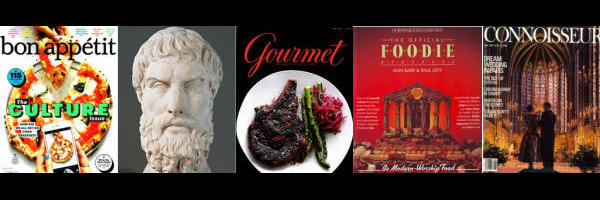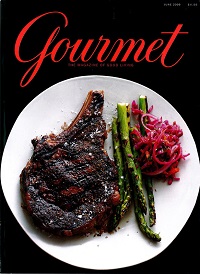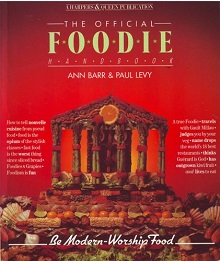
An American living in Paris will at some point find himself at a dinner party at which he or another guest will wish a collective “Bon appétit” to the table gathering, only to be admonished for the impropriety of saying such a thing. If you are the one making the alleged social blunder, this is what will ensue.
The admonisher, backed by the supercilious smiles of snotty companions, will inform you that appétit (appetite) refers to the physical act of digestion and the animal desire to chow down rather than to the appreciation and pleasure of sharing a meal. Since it’s inappropriate to speak of the workings of the intestines at the dinner table, he’ll explain, “Bon appétit” is a cultural no-no. At least “in good society,” he’ll add in case you missed the condescension.
To say “Bon appétit,” according such thinking (though it isn’t so much thinking as an expression of dismay that there so few servants around), is akin to acknowledging that the queen has passed gas and that the exquisite meal before you shall end up in the plumbing tomorrow morning. You are led to understand that “Bon appétit,” or “Bon app,” as it is more informally and ridiculously said, may be common at tables where poor schmucks are lucky enough to have fuel for the body, but not among proper company such as this—though you’re to be excused as a foreigner for not knowing better, just don’t let it happen again. Digest later, if you must, for now we’re dining.
[Interestingly, this article in a major French daily, Le Figaro, (published several days after my initial text and sent to me by an amused French reader), even in arguing the case against “Bon appétit,” appears to acknowledge that it’s use or non-use is a question of class, given its popularity among the necessarily improper common folk. The article also blames Americans for being crass enough to consider “Bon appétit” acceptable and thus spread bad manners.]
There’s no need to be cowered by this faction of the snobocracy in France. For them, “Bon appétit” may be inverted code for “not one of us,” but generally speaking it refers no more to digestion today than “snob” now refers to the shoemaker of its etymological origin.
Nevertheless, it’s worthwhile being seated at such tables because tables of abundance abound with insights into culture, society, individuals, ritual and etiquette, along with the pleasures of the food and drink served.
Looking around the table as you dine in Paris and travel in France, you may recognize some of the people described below. You’re likely to meet them at home as well. You may even identify with one of these terms yourself. Magazine publishers certainly think you do.

Epicures: Epicures are exceptional connoisseurs of pleasure, luxury, and/or sensuality, generally relative to food and drink. Their storehouse of knowledge and experience give them sensitive and discriminating tastes. For instance, an epicure knows how to stick his nose deep into a glass of red wine, though he sometimes does it in a way that makes non-epicures want to push his face into it. Epicures can be pleasant conversationalists at a dinner party, but as they describe their food travels they may reveal an edge of anxiety if you don’t share their opinions. That’s the time to suggest that they read up on the life and thought of the ancient Greek philosopher Epicurus, and to chill out.
 Gourmets: Gourmets may be less refined than epicures but have educated palates nonetheless and are generally better cooks. A gourmet certainly knows food and fully grasps the meaning of words like braised, blanch and deglaze. Though a gourmet need not know how to cook, the word is frequently used to qualify someone’s cooking skills, as a gourmet chef. The demise in 2009 of the American magazine Gourmet might be attributed to the fact that the word itself no longer made enough upscale food folk drool. By then, foodies had come of age.
Gourmets: Gourmets may be less refined than epicures but have educated palates nonetheless and are generally better cooks. A gourmet certainly knows food and fully grasps the meaning of words like braised, blanch and deglaze. Though a gourmet need not know how to cook, the word is frequently used to qualify someone’s cooking skills, as a gourmet chef. The demise in 2009 of the American magazine Gourmet might be attributed to the fact that the word itself no longer made enough upscale food folk drool. By then, foodies had come of age.

Foodies: Foodies is a term coined in the 1980s, and for a while they were the Trekkies of the food chain. But by the end of the 1990s the success of the Food Network and cooking shows around the world proved that there were minions of food-worshippers seeking ways to glorify their own appetite. The term’s trajectory naturally matches that of Whole Foods. Foodies are more faddish and perhaps more gullible than gourmets, yet they can also be more joyous and more passionate in congratulating themselves for fulfilling their (bon) appetite.
Gastronomes: Gastronomes are close to epicures in that they have a wealth of food knowledge and dining experience that have earned them discerning tastes. They are enthusiasts, fond of judging and comparing, and can thus be name-droppers when it comes to fine restaurants. Though not necessarily snobs, gastronomes have been known to miss out on the social sensuality and pleasure of the dining experience. Nevertheless, one would be remiss in refusing a dinner invitation from a gastronome due to the pleasure they take in the art of cookery. Gastronomy, of course, is their game. As a house gift, better to bring flowers or chocolates than wine because the gastronome invariably has something “more appropriate” to serve.
 Connoisseurs: From the French word literally meaning “one who knows,” i.e. an expert. The connoisseur is typically qualified by the object of his expertise, wine connoisseur being the prime example. When a connoisseur knows how to keep his abundance of knowledge in check, he’s a welcome guest. His ability to appreciate subtleties in his field often make for informative and entertaining company. Some connoisseurs, however, dominate the conversation with their their expertise, which then also makes them bores. The wine connoisseur, for example, can come in handy when it comes to choosing wine, as long as he doesn’t spend the evening complimenting himself on his selection.
Connoisseurs: From the French word literally meaning “one who knows,” i.e. an expert. The connoisseur is typically qualified by the object of his expertise, wine connoisseur being the prime example. When a connoisseur knows how to keep his abundance of knowledge in check, he’s a welcome guest. His ability to appreciate subtleties in his field often make for informative and entertaining company. Some connoisseurs, however, dominate the conversation with their their expertise, which then also makes them bores. The wine connoisseur, for example, can come in handy when it comes to choosing wine, as long as he doesn’t spend the evening complimenting himself on his selection.
 Mavens: Think of maven as the Yiddish translation of the French word connoisseur and you’ll begin to seize the difference. Mavens are generally highly educated people with a specific expertise, which makes them great company… for a book. Unfortunately, at the dinner table, while they can wow the assembly with their expertise, they seem to believe that their expertise in one thing makes them experts in everything, including everything on your plate and every topic of conversation.
Mavens: Think of maven as the Yiddish translation of the French word connoisseur and you’ll begin to seize the difference. Mavens are generally highly educated people with a specific expertise, which makes them great company… for a book. Unfortunately, at the dinner table, while they can wow the assembly with their expertise, they seem to believe that their expertise in one thing makes them experts in everything, including everything on your plate and every topic of conversation.
Gluttons: Gluttons, given to immoderate consumption, are voracious and wolfish eaters and drinkers. Some gourmets and connoisseurs are closet gluttons, using their intellectual interest in good food and wine as a cover for a greedy appetite. But a glutton who acknowledges that he’s a glutton can, despite the tendency to self-abuse, be a fun eating companion, every now and then, though you’re likely to find yourself overindulging while in his company.
Gourmands: A gourmand has a good appetite and may also have discerning tastes, but since the strength of his appetite is greater than his need to discern he won’t turn his nose up at anything. He may well be married to a gourmet. Sitting between the quantity needs of the glutton and the quality interests of the gourmet, the gourmand is nevertheless occasionally given to excess. The British magazine The Gourmand thus put this fellow on a recent cover:
Bons vivants (or bon vivants): Literally ones who live well or are fond of good living, the term refers to those with a healthy, lively appetite for the finer things in life, particularly food and drink. Their good humor makes for jovial company. “Let’s get another bottle, I’ll pay for it,” they say. When the bill comes they don’t always have the cash on hand, but you accept their generosity of spirit as payment enough. They sometimes calm down after their first heart attack.
Bon appétit!
© Gary Lee Kraut

